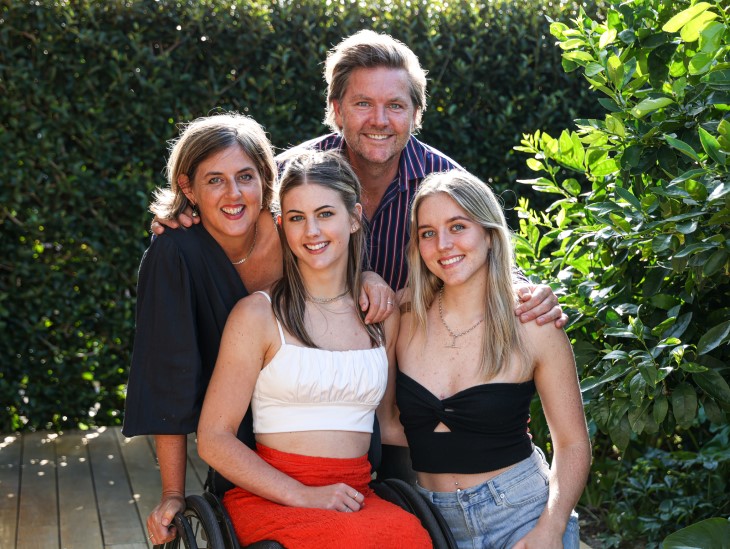Brendan's story: Recovering from a life-changing injury to help others
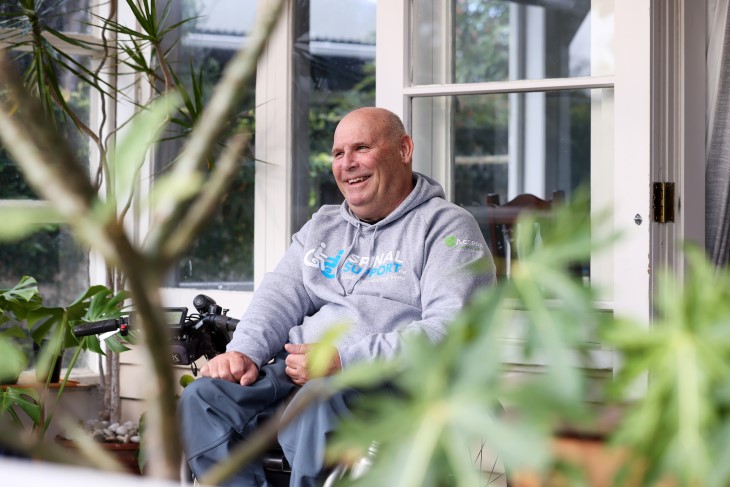
Twenty-four years ago, Brendan Tourelle sustained a life-changing injury when he fell from a ladder and broke his back. Over time, he has recovered and is now reflecting on a life of helping others.
Brendan Tourelle woke up in the ICU in intense pain with no memory of what had happened.
The then 38-year-old from Auckland was renovating a shopfront in Mt Eden and was looping a rope around some scaffolding, when the foot of his ladder slipped out from under him.
Brendan hit his head on the wall and was knocked out. He fell “like a sack of spuds” from 6m onto the wing-mirror of a van below.
“The van broke my back, but it also broke my fall,” says the former tradie from his home in Te Atatu. “The doctors said if I’d landed on my head, I would have been a goner.”
The nurse in ICU asked Brendan, “Do you know what happened?” and he managed a shake of his head. She told him he had fractured his back and his spinal cord was damaged in two places.
“The whole area was pretty smashed up,” he says. “At the time, I was 38 and had four kids under the age of nine. I was scared and worried about how I would provide for them.”
Brendan underwent surgery in which they inserted two large rods into his spine. He spent two weeks in Auckland Hospital and three months in the Auckland Spinal Unit in Ōtara.
He remembers getting a visit from an ACC liaison officer who put him at ease. She said ACC would support him and his family.
“That was a huge weight off my shoulders with a young family to provide for.”
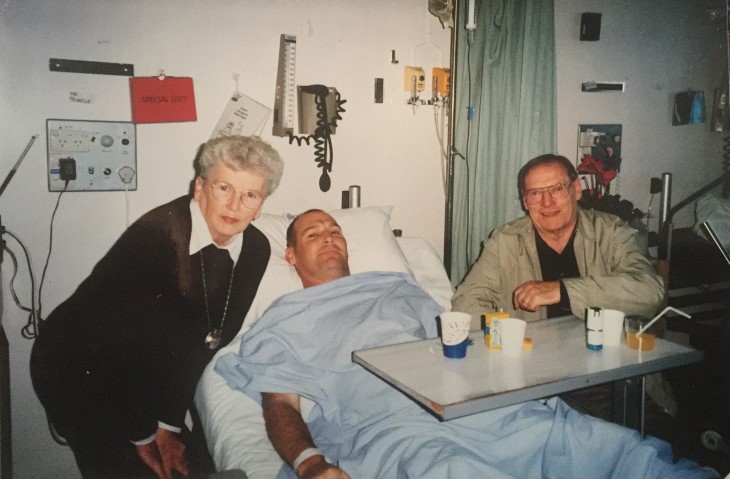
Brendan with his parents at Auckland Hospital a few days after his accident in 1999.
Starting again
Brendan says the spinal unit was a humbling place to be as he realised “there were a lot of people who were far worse off than me”.
He was motivated to tick off his goals in his rehab so he could get back home to help his wife Tulip.
“I didn’t dwell on my injury too much. My main goal was to not let my situation affect the kids. I wanted them to carry on and have a normal life.”
He found the move home the most difficult part of his recovery journey as the reality of his injury was confronting.
“That first year was the hardest, even though I was keeping a brave face for the kids, from time to time the frustrations would get the better of me. It was very hard to live with the realities of having a spinal injury.”
He credits his wife for having the patience of a saint.
“She helped me heal and got me back to a place where I could be at peace with my reality.”
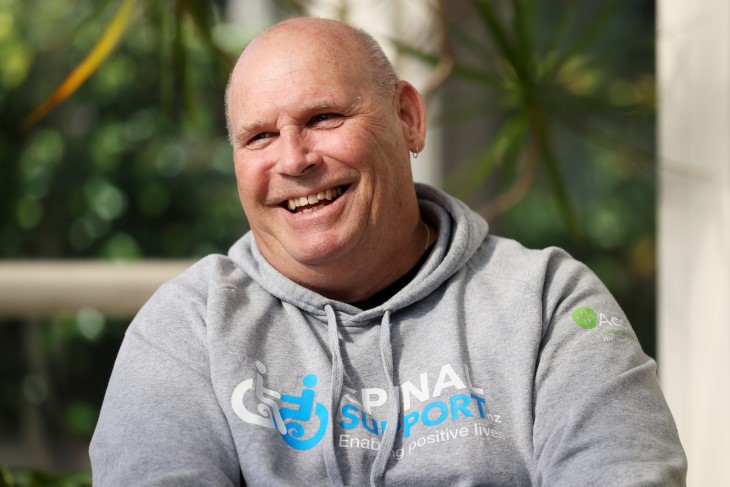
Brendan says his main goal was for his injury to not affect his kids. Photo credit Simon Watts / BW Media.
‘Kissing those dreams goodbye’
Brendan had worked in the trades, waterproofing and painting high rises and buildings for the previous 15 years.
He has reflected on that day – 13 May 1999 – many times. He should have insisted to the main contractor that he had someone to hold the bottom of his ladder.
“I knew it was risky,” he says.
ACC accepts around 21,000 DIY injuries every year. The most common injury is to the back and spine (around 3,900 claims) while around 3,000 people hurt themselves by losing balance or personal control.
“You have got to stop and think. I’d been in the trades since 1983 and up and down ladders the whole time. I didn’t give it a second thought. It’s easy to take those short cuts. One moment can have a lifelong consequence.”
Brendan's family were a few weeks away from moving to Samoa. They had built a boat and were sending the boat up to the Pacific island to do charter fishing there and start a new life. They were waiting on the final license.
“It was devastating to see that dream gone,” says Brendan. “I still remember selling the boat we had built. Part of the grieving you go through when you have a serious injury is kissing those dreams goodbye.”
Selling the boat allowed Brendan and his wife the chance to buy their family home in Te Atatu. It’s where they raised their four kids and set them up for life.
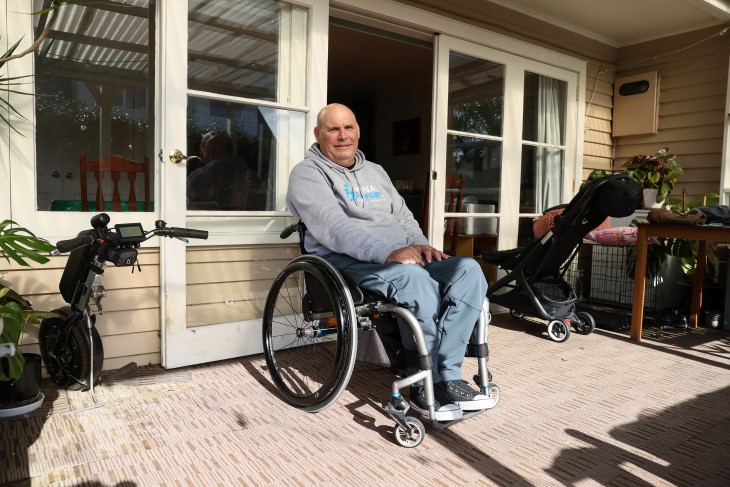
Brendan and his wife Tulip raised their four kids in their Te Atatu home. Photo credit Simon Watts / BW Media.
Helping others for life
Soon after Brendan arrived home, he got back into work. He wanted to help others and hasn’t stopped 24 years later.
He first started at Spinal Support New Zealand (SSNZ) - which in those days was known as TASC (The Association of Spinal Concerns) - in 2000.
Brendan had never been on a committee before, so it was a steep learning curve. The following year, he joined Parafed and was a liaison between the two charities.
He has been at SSNZ ever since and this November finishes his five-year term as president.
Brendan says the best thing he achieved in his time as president was helping set up the partnership with the NZ Spinal Trust for ACC to fund Peer and Whānau Support around the country.
He says the network of people living with a spinal cord impairment is making a huge difference.
“There’s nothing like lived experience,” he says.
“You can envisage it but it’s not the same as life in a chair. A lot of people really struggle initially with the idea of being seen in public in a chair.
“Many of them think, ‘Everyone is staring at me’, so having support to overcome these misconceptions is vital.”
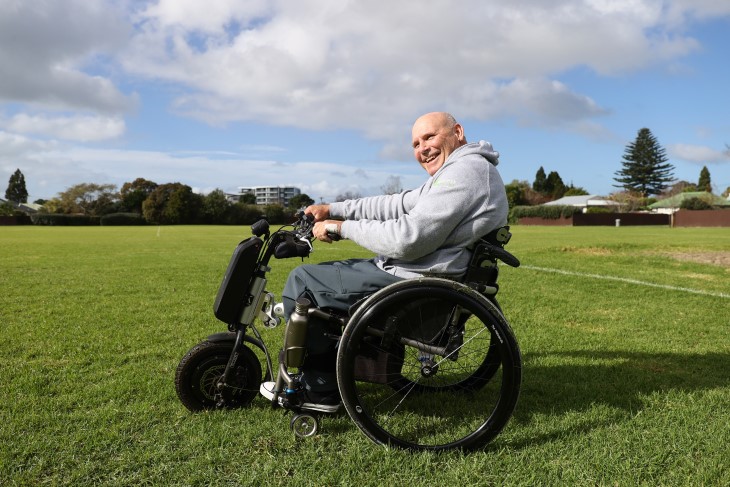
Brendan is proud to have helped set up the partnership with the NZ Spinal Trust for ACC to fund Peer and Whānau Support around the country. Photo credit Simon Watts / BW Media.
Getting back on the ocean
Growing up, Brendan's dad was a swimming coach, so he and his siblings learned to swim at a young age. He fell in love with surfing, fishing and anything to do with the sea.
Following his accident, he tried to get back into swimming, but it was too difficult with the rods in his back.
“A big goal of mine was to reconnect with the ocean,” he says. “In a chair that’s hard to achieve.”
His swimming coach introduced him to Sailability Auckland – a charity which provides opportunities for people with disabilities to learn to sail – and it was the turning point.
He joined the committee in 2003 and has been the chairman since 2006.
He could see with some equipment and support, people with higher level disabilities could get back on the water. They set up a sailing simulator at the Ōtara Spinal Unit which helps people find a new passion.
He says the moment when disabled people realise they can sail a boat is incredible.
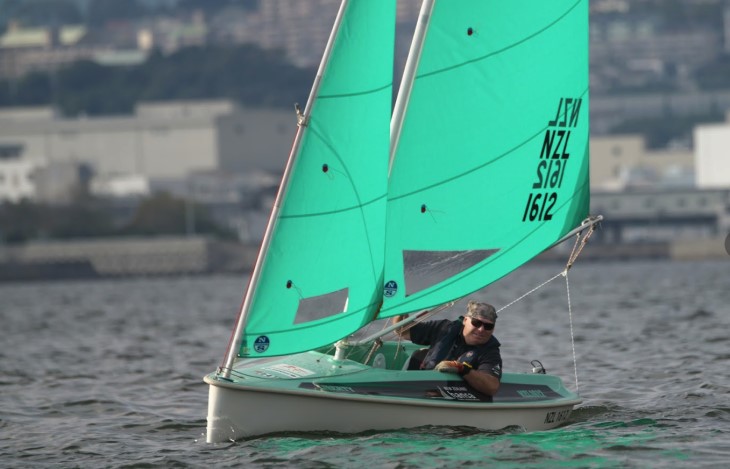
Sailability Auckland is a charity which provides opportunities for people with disabilities to learn to sail.
“A lot of people come back onto the shore in tears of joy, especially highly-injured people. It’s a game-changing moment. They might be living in a power-chair and relying on someone else to do everything for them, but in our boats they are totally free, and they are in control.”
After his accident, Brendan has dedicated himself to helping others.
“When you go through a life-changing injury, there are a lot of people that help put you back together, and I felt the need to say thank you in some way. You see the good this is doing and you get hooked by that rewarding feeling.”
He has sound advice for people who have sustained a life-changing injury.
“Firstly, give yourself time to grieve so you come out of it with good mental health,” he says.
“And, if you get the chance to try something new, give it a go. You don’t know where that moment will lead, and you don’t know when that opportunity will come again.”




